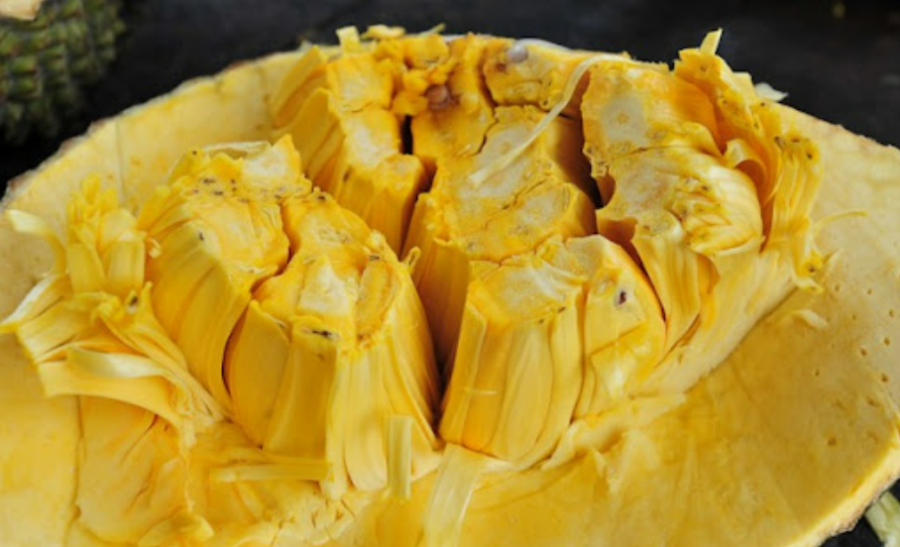According to Vietnamnet, Bui Dac Sang, a renowned traditional medicine practitioner in Hanoi, stated that jackfruit is a common fruit among Vietnamese people. Its chemical and nutritional composition offers various health benefits. The edible portion of the jackfruit consists of 72.3% water, 1.7% protein, 23.7% carbohydrates, and 0.3% lipids.
Per 100g, the jackfruit’s edible portion provides 27g of calcium, 38mg of phosphorus, 0.6mg of iron, 2mg of sodium, and 407mg of potassium, along with various vitamins, contributing to a total of 94 calories. In traditional medicine, jackfruit is believed to have a sweet and fragrant taste with a slightly sour note. It is considered to strengthen the spleen and stomach, tonify the qi, enhance one’s complexion, and alleviate irritability and thirst.
Ripe jackfruit is often used as a remedy for hangovers. Additionally, other parts of the jackfruit tree, such as the wood, resin, and leaves, possess medicinal properties. The leaves, in particular, are used to prepare drinks that promote lactation in postpartum women and aid in healing open wounds.
While jackfruit offers numerous benefits, it is important to consume it appropriately to avoid any adverse effects on your health. Here are some considerations to keep in mind when eating jackfruit:
Avoid Eating Jackfruit on an Empty Stomach
Although jackfruit is a delicious treat, consuming it when hungry can cause a sudden spike in blood sugar levels, leading to feelings of fullness, indigestion, and abdominal dist. Therefore, it is advisable to eat jackfruit one to two hours after a meal to ensure it does not negatively impact your health.
Don’t Overeat Jackfruit
Jackfruit is nutrient-dense and contains significant amounts of sugar and energy. Overeating jackfruit can lead to digestive issues like bloating and indigestion. Moreover, jackfruit has a heating property, so consuming too much can cause heat-related issues, especially for those prone to skin conditions like rashes and itching.
For individuals who already experience digestive problems, eating jackfruit in excess can exacerbate these issues. The sudden surge in blood sugar levels can further contribute to feelings of fullness and indigestion.
Avoid Eating Jackfruit in the Evening
Consuming jackfruit in the evening may disrupt your digestive system due to its high fiber content, especially the seeds. Additionally, the edible portion of the jackfruit is energy-dense and possesses heating properties, which can contribute to abdominal fat accumulation, heat-related discomfort, and sleep disturbances.
It is recommended to eat jackfruit one to two hours after breakfast or lunch. Combining jackfruit with other ripe fruits ensures a sufficient intake of vitamins and minerals for the body.

Groups Who Should Avoid or Limit Jackfruit Consumption
Individuals Prone to Skin Eruptions and Rashes
Despite its nutritional benefits, jackfruit may not be suitable for individuals who frequently experience skin issues like boils and rashes.
Individuals with High Blood Pressure
The high sugar content in jackfruit can cause a rapid increase in blood sugar levels, leading to dizziness and blurred vision.
Individuals with Fatty Liver Disease
While jackfruit is rich in nutrients and vitamins, it is also high in sugar, which may negatively impact liver health. Therefore, those with fatty liver disease are advised to refrain from consuming jackfruit regularly and may need to avoid it altogether.
Individuals with Chronic Illnesses
People with chronic conditions should consume jackfruit in moderation. When eating jackfruit or mango, it is essential to remove the resin and chew the fruit thoroughly, avoiding consumption in the late afternoon or evening. For children and the elderly, it is advisable to cut the fruit into small pieces or puree it.
Individuals with Diabetes
Diabetics must follow a strict diet that limits sugar intake. Jackfruit, however, contains significant amounts of fructose and glucose, which are rapidly absorbed by the body, leading to a quick rise in blood sugar levels.
As a result, dietary guidelines recommend that diabetics consume only a tiny amount of jackfruit and limit their intake of other fruits when eating jackfruit.
Individuals with Chronic Kidney Disease
People with chronic kidney disease should avoid potassium-rich foods like jackfruit. In individuals with kidney disease, elevated potassium levels can lead to hyperkalemia, which, if left untreated, can cause cardiac arrest. Therefore, it is crucial for those with chronic kidney disease to refrain from consuming jackfruit.
Individuals with Asthenia and Weak Health
For individuals with weak health or asthenia, consuming large amounts of jackfruit may result in digestive discomfort, a feeling of fullness, and an increased workload for the heart. It is recommended that these individuals avoid heating fruits like jackfruit and mango or consume them in moderation while monitoring their body’s response.





































